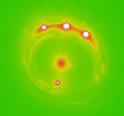Of the ever-expanding reach of science, macroscopic version
[ by Charles Cameron — I imagine there’s a microscopic version, too ]
,
Here’s an illustration of our Sun’s family tree (sadly scaled down in upper image, below) —



— and here (pleasantly blown up in lower image, above) is an image of the first planets discovered outside our milky way
**
From New Scientist on the sun’s family tree as imaged above::
The coloured circles on this chart represent 21 stars whose chemical compositions have been compared with that of our sun, and each other’s. This elemental DNA shows that three groups, marked in red, pink and yellow, deserve their own branches on the family tree. Taken together with their age and behaviour, these similarities can be used to infer the secrets of the stars’ origins.
Poster and more details at https://drive.google.com/file/d/12nrya5PqauRX_3TAfKrPuz7fQUHKom78/view.
For the first planets discovered beyond our milky way?
Image of the gravitational lens RX J1131-1231 galaxy with the lens galaxy at the center and four lensed background quasars. It is estimated that there are trillions of planets in the center elliptical galaxy in this image,
NBC, The First Planets Beyond The Milky Way May Have Been Discovered
See also:
DoubleQuote!
**
As I said in brackets at the very top of this post, I imagine there’s a microscopic version of this macro expanding scientific vision too — but do the arts and humanities have an expanding introscopic equivalent?